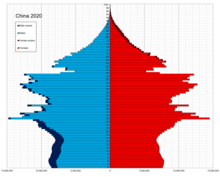Three-child policy

Three-child policy (Chinese: 三孩政策; pinyin: Sānhái Zhèngcè), whereby a couple can have three children, is a family planning policy in the People's Republic of China.[1][2] The policy was announced on 31 May 2021 at a meeting of the Politburo of the Chinese Communist Party (CCP), chaired by CCP General Secretary, Xi Jinping, on population aging.[3][4] The announcement comes after the release of the results of the Seventh National Population Census, which showed that the number of births in mainland China in 2020 was only 12 million, the lowest number of births since 1960, and the further aging of the population, against which the policy was born.[5] This was the slowest population growth rate China experienced.[6] The state-owned Chinese news agency, Xinhua, stated that this policy would be accompanied by supportive measures to maintain China's advantage in human labor.[3] However, some Chinese citizens expressed dissatisfaction with the policy, as they will be unable to raise children due to the high cost of living in China.[7][4]
Background[]

Beginning in 1979, China implemented the one-child policy, which stipulated that a couple can only have one child, resulting in a declining new population and a rapidly aging society. In order to slow down the trend of population aging, in 2015, the CCP officially launched the two-child policy, which relaxed the birth restrictions. However, the policy did not result in the expected wave of births, and the pregnancy rate among young women continued to show a record low decline, experiencing a third consecutive year of decrease.[8] In this regard, during the 2020 National People's Congress (NPC) session, NPC deputy Huang Xihua suggested removing the penalty policy for having more than three children.[9]
See also[]
References[]
- ^ "China announces three-child policy, in major policy shift". India Today. Beijing. Reuters. 2021-05-31. Retrieved 2021-05-31.
- ^ "China allows couples to have three children". BBC News. 2021-05-31. Retrieved 2021-05-31.
- ^ a b "China introduces three-child policy in response to ageing population". www.abc.net.au. 2021-05-31. Retrieved 2021-05-31.
- ^ a b Wee, Sui-Lee (2021-05-31). "China Says It Will Allow Couples to Have 3 Children, Up From 2". The New York Times. ISSN 0362-4331. Retrieved 2021-05-31.
- ^ "三孩生育政策来了". 新华网. Retrieved 2021-05-31.
{{cite web}}: CS1 maint: url-status (link) - ^ "China announces three-child policy, in major policy shift". The Japan Times. 2021-05-31. Retrieved 2021-05-31.
- ^ "Cost of Living in China". www.numbeo.com. Retrieved 2021-10-06.
- ^ Wee, Sui-Lee; Myers, Steven Lee (2020-01-17). "China's Birthrate Hits Historic Low, in Looming Crisis for Beijing". The New York Times. ISSN 0362-4331. Retrieved 2021-06-01.
- ^ "全国人大代表黄细花:建议取消生育限制,取消生三孩以上处罚". 澎湃新闻. Retrieved 2021-06-01.
{{cite web}}: CS1 maint: url-status (link)
- Birth control law and case law
- Demographics of China
- Human overpopulation
- One-child policy
- Population ecology